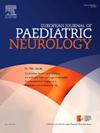Assessment of psychosocial adjustment and reduced initiative in children with myotonic dystrophy type 1: a pilot study on the reliability and clinical utility of a short parent-report questionnaire
IF 2.3
3区 医学
Q3 CLINICAL NEUROLOGY
引用次数: 0
Abstract
We describe the reliability and clinical utility of the personal adjustment and role skills scale III (PARS-III) for screening of psychosocial adjustment in children with myotonic dystrophy type 1 (DM1). Data of 36 pediatric DM1 patients were included from the Dutch MYODRAFT patient registry. Reliability was assessed using Cronbach's alpha. Associations between PARS-III scores and estimates of brain-related comorbidity and parent-reported physical disease burden were explored as possible factors affecting psychosocial adjustment. PARS-III data of children with DM1 in this study were compared to PARS-III data from children with Duchenne muscular dystrophy in order to describe specificity to the pediatric DM1 population. The PARS-III showed adequate internal consistency. PARS-III total scores correlated with parent-reported symptoms of autism spectrum disorder and attention deficit/hyperactivity disorder and parent-reported physical disease burden. No statistically significant associations were found with intelligence. Parents reported most problems in reduced social activity and reduced initiative. Reduced initiative was not associated with attention deficit/hyperactivity disorder, autism spectrum disorder or reported physical disease burden. Parents of children with DM1 reported more problems in initiative compared to parents of children with Duchenne muscular dystrophy. We conclude that the PARS-III is a reliable instrument for screening psychosocial adjustment in general and deficits in initiative in particular. More research is needed on this clinically relevant symptom as a possible brain-related comorbidity of children with DM1.
评估1型肌强直性营养不良儿童的心理社会适应和主动性降低:一项关于简短父母报告问卷的可靠性和临床应用的初步研究
我们描述了个人适应和角色技能量表III (PARS-III)筛选1型肌强直性营养不良症(DM1)儿童的社会心理适应的可靠性和临床应用。36名儿童DM1患者的数据来自荷兰MYODRAFT患者登记处。采用Cronbach’s alpha评估信度。PARS-III评分与脑相关合并症和父母报告的身体疾病负担之间的关联被探讨为影响心理社会适应的可能因素。本研究将DM1患儿的PARS-III数据与Duchenne肌营养不良患儿的PARS-III数据进行比较,以描述儿童DM1人群的特异性。PARS-III显示出足够的内部一致性。PARS-III总分与父母报告的自闭症谱系障碍、注意缺陷/多动障碍症状和父母报告的身体疾病负担相关。没有发现与智力有统计学意义的关联。父母报告的主要问题是社交活动减少和主动性降低。主动性降低与注意缺陷/多动障碍、自闭症谱系障碍或报告的身体疾病负担无关。与杜氏肌营养不良儿童的父母相比,DM1儿童的父母报告了更多的主动性问题。我们的结论是,PARS-III是一种可靠的工具,用于筛查一般的社会心理适应,特别是主动性缺陷。这一临床相关症状作为DM1患儿可能的脑相关合并症还需要更多的研究。
本文章由计算机程序翻译,如有差异,请以英文原文为准。
求助全文
约1分钟内获得全文
求助全文
来源期刊
CiteScore
6.30
自引率
3.20%
发文量
115
审稿时长
81 days
期刊介绍:
The European Journal of Paediatric Neurology is the Official Journal of the European Paediatric Neurology Society, successor to the long-established European Federation of Child Neurology Societies.
Under the guidance of a prestigious International editorial board, this multi-disciplinary journal publishes exciting clinical and experimental research in this rapidly expanding field. High quality papers written by leading experts encompass all the major diseases including epilepsy, movement disorders, neuromuscular disorders, neurodegenerative disorders and intellectual disability.
Other exciting highlights include articles on brain imaging and neonatal neurology, and the publication of regularly updated tables relating to the main groups of disorders.

 求助内容:
求助内容: 应助结果提醒方式:
应助结果提醒方式:


